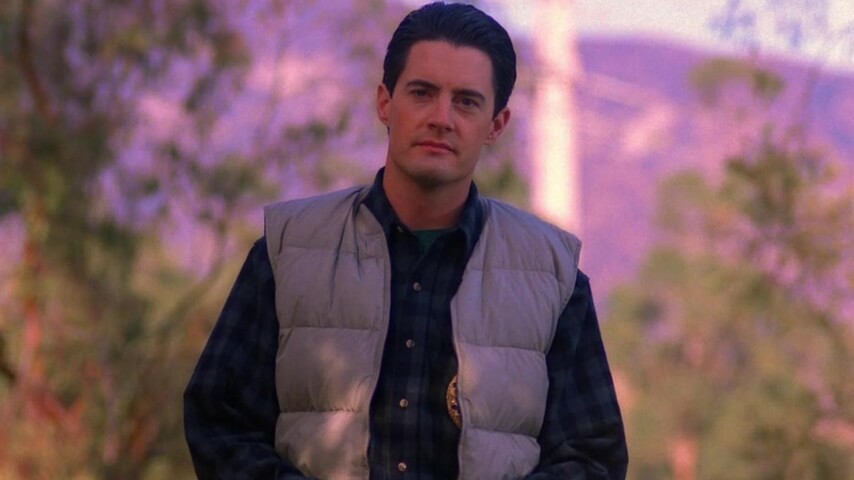Just a fair warning: I’m not going to dwell on these episodes too much since I think we can all agree that we’ve reached the end of Twin Peaks. Or at least we’ve reached an area that’s ass-end adjacent. These two episodes conclude the storylines usually quick to be referenced when people talk about the show’s decline: The James-wanders-off-to-another-town-and-meets-the-Femme-Fatale story and the Ben-Horne-relives-the-Civil-War story. They will not be missed.
In an episode far more solidly put together than its contents deserve we deal with the aftermath of Episode 20’s two shocking developments: The discovery of a Windom Earle’s victim in the police station and the return of a fully cognizant Leo. The latter is effectively staged like a scene from Frankenstein. (Too bad the writers tip their hand by having Bobby call him “Leostein” in the next episode.) The former stokes the fires of the Windom Earle plot, fires that will be extinguished almost from the moment we meet Earle later in this episode.
But first, we have to learn some uncomfortable facts. Coop, it turns out, made a cuckold of his former partner Earle. He’s not the saint he would seem, it turns out. Is this poor characterization or does it make sense for him? Could this past transgression have inspired him to become a better man? We also learn that Big Ed and Super Nadine, soon to reach an agreement about their relationship, have been doin’ it. Yuck.
Also, James finds a catchphrase (something one of the readers referenced a couple of weeks back.) “It’s wrong!” He says it twice in this episode, once getting the reply, “Love isn’t wrong, James.” This episode, on the other hand, is. Also, David Warner shows up to be the series’ latest underutilized guest star. I don’t even remember his storyline at all from my first time through this show. Then again, I just watched this episode and I barely remember it.
Grade: C
Episode 15
And now we reach the divisive Diane Keaton episode. Some Peaks fans hate it. Others, well, I don’t know that anyone loves it. Put me in the it’s-really-not-so-bad camp. Keaton doesn’t so much break with the established style as try to intensify it. This is the most Lynch-like episode since Lynch stopped directing. (Or maybe it’s Lynch Lite.) Whichever, it at least didn’t bore me. In fact, if Keaton had gotten a crack at a better part of the series, I suspect this episode wouldn’t have the mixed rep it has. Instead she has to wrap up the Femme Fatale story–accomplished in part by lots of loving but kind of unflattering close-ups of actress Annette McCarthy–and lots of Windom Earle business.
About that: Canadian actor Kenneth Welsh has enjoyed a long, successful run as a character actor in a career that stretches from the ’60s to the present. But, boy, is he not convincing here. It doesn’t help that he’s given an almost impossible role to play. He’s a master criminal with a sideline in make-up and funny accents. Maybe Silence Of The Lambs-era Anthony Hopkins could have pulled this off. Maybe. But here Welsh has to embody evil while wearing long underwear and the occasional ridiculous disguise. In the latter mode, he’s only slightly more convincing than Pistachio Disguisey, Dana Carvey’s character in the not-so-fondly remembered 2002 comedy Master Of Disguise
You tell me:
Windom Earle
Pistachio Disguisey
Earle will be with us for a while. But at least we wrap up James’ sub-plot–he was right; it was wrong–and get Horne out of the Civil War, if not back to normal. So more stupid disguises and chess moves await us. (Hey, good thing Pete’s a master chess player, right?) But at least we can say farewell to Ben’s over-the-top cuckoo-osity and dialogue referring to the “good and honest way” James tastes. The aftertaste is pretty bitter.
Grade: C+


 Keep scrolling for more great stories from A.V. Club.
Keep scrolling for more great stories from A.V. Club.